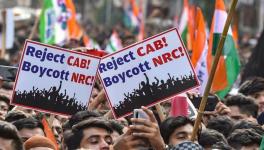Global Criticism of India Should be Taken Seriously, Not Swatted Aside

India has been receiving a lot of flak in international fora for successive state actions that have been seen as deeply disturbing in the context of the erosion of democratic practice. The office of United Nations High Commissioner for Human Rights (UNHCHR) Michelle Bachelet Jeria is set to file an application in the Supreme Court seeking to intervene as a friend of the court in respect of a petition challenging the constitutionality of the Citizenship (Amendment) Act (CAA), 2019, while British Members of Parliament across the political spectrum have queued up to criticise the citizenship act.
The actions of the current regime have been seen as subversive of pluralism, tolerance and the fundamental right to protest and dissent. The abrogation of Article 370 of the Constitution, the passage of the CAA and the pathologically-divisive election campaign run by the Bharatiya Janata Party (BJP) in Delhi, leading to the National Capital’s worst riots in three decades, have been flagged as matters of concern.
The Indian political establishment in general and the Union government in particular have swatted these concerns aside, arguing that all these are ‘internal’ matters and no external agency has the locus standi to interfere, including the UNHCHR.
In a number of instances, which we will detail presently, the Union government has a point, especially because the credentials of many critics are not brightly burnished. But this stock argument is also looking a little shop-worn as it is being trundled out to meet criticism that sounds legitimate and is voiced by agencies or people who seem to have no partisan axe to grind. We could begin by pointing out that India’s reputation as a constitutional democracy has taken a serious beating around the world and that is likely to have some effect on how other nations deal with it. And this could well have some unpropitious outcomes.
Let us begin with the latest barrage of criticism. Bachelet’s critique of the CAA and, by extension, the regime is most forceful because it is balanced. The UNHCHR has not rubbished this piece of legislation. It has, on the contrary, praised it as an attempt to provide refuge to persecuted minorities in neighbouring countries. What her office has objected to—and what all protestors within India, who certainly have the right to question and contest the regime’s actions, have protested against—is the attempt to provide refuge selectively on the basis of religion.
In other words, the UNHCHR objects to the exclusion of Muslims from the list of persecuted minorities when it is well known that Myanmar has ‘ethnically cleansed’ the Rohingya Muslim population of the country, creating the single largest community of stateless people in the world, apart from visiting genocidal brutalities on it. The International Court of Justice has already said in a preliminary ruling that Myanmar must act to stop this genocide. The Ahmadiyya and Shia communities are also subject to persecution in Pakistan and the Hazara community in Pakistan and Afghanistan.
As mentioned, the Indian establishment has said the United Nations’ body does not have the right to interfere in the country’s internal matters and says, inexplicably, that the CAA is constitutionally valid. We must forgive the citizenry for thinking that the question of constitutionality will be decided by the Supreme Court, which is at present sitting on a bunch of petitions challenging the Act, rather than the Ministry of External Affairs.
Whether or not the UNHCHR's application to the Supreme Court will pass muster remains to be seen, but Bachelet points out that the office of the UNHCHR has intermediated at the European Court of Human Rights, the US Supreme Court and elsewhere. The idea is not as absurd as it may be made out to be.
With a near simultaneity that must be coincidental, MPs from the Labour Party, the Liberal Democratic Party, the Scottish Nationalist Party and the Conservative Party tore a strip off the CAA in the UK House of Commons, urging the British government to act against India. In response to a specific demand, Nigel Adams, junior minister in the Foreign and Commonwealth Office, told the House that the British government would not ‘pursue trade to the exclusion of human rights’. Referring to the Delhi riots, a Tory member said videos ‘showed shocking, orchestrated, sectarian violence’. This kind of cross-party condemnation cannot be dismissed out of hand, precisely because Prime Minister Boris Johnson’s dispensation in London favours the current regime in India.
In January, the United States Congress had been briefed on the situation in India in the context of the CAA/NRC, in less than flattering terms, by human rights groups. In a few days, a resolution had been tabled in the European Parliament that was sharply critical of the ‘discriminatory’ and deeply divisive CAA. Earlier that month, The Economist had run a cover story headlined Intolerant India: How Modi is endangering the world’s biggest democracy. And the Economist Intelligence Unit had released its global democracy rankings in which India had fallen 10 places.
Last month, the United States Commission on International Religious Freedom (USCIRF), a body set up by the United States Congress, had expressed serious misgivings about the CAA and National Register of Citizens working in tandem to create a legal framework disenfranchising Muslims. It is also scheduled to hold a hearing in this connection. It had also expressed concern about the Act, then a Bill, in December last year.
The point is not whether there is anything sacrosanct about criticism from the USCIRF or resolutions tabled in the European Parliament. One could well point to the United States’ recent record on the way it treats ‘undocumented migrants’ and the presence within the European Union of countries like Hungary, which is governed by a regime that does not even make it to first base as far as democratic credentials are concerned.
There are, really, two important points to consider: one is practical and the other is a matter of principle. In practical terms, we must recognise that India is not exactly a superpower and needs partnerships in many different arenas with what is left in the world of liberal democracy. To do this, it would not hurt to keep the framework of constitutional democracy intact. This is not to say that should there be further erosion of democratic structures and values, the ‘free’ world will abandon India. For decades (if not over a century), liberal democracies have had no problems partnering with the most illiberal, authoritarian and obscurantist regimes. They have done their fair bit to shore up the most criminal of regimes in the last century and this one. Think of the United States and South and Central America, the United Kingdom and Africa, and everybody and West Asia. But constant and legitimate criticism of the direction India is headed in does undermine its standing in the international community and weakens it.
From the point of view of principle, neither the example set by the ‘West’ nor the illiberal regimes they support constitutes grounds to discommend legitimate criticism. India must follow its own democratic trajectory, even though it may not describe a perfect arc. The current regime’s determination to precipitate a race to the bottom will weaken India, never mind the mindless rhetoric of muscular nationalism.
The author is a freelance journalist and researcher. The views are personal.
Get the latest reports & analysis with people's perspective on Protests, movements & deep analytical videos, discussions of the current affairs in your Telegram app. Subscribe to NewsClick's Telegram channel & get Real-Time updates on stories, as they get published on our website.
























